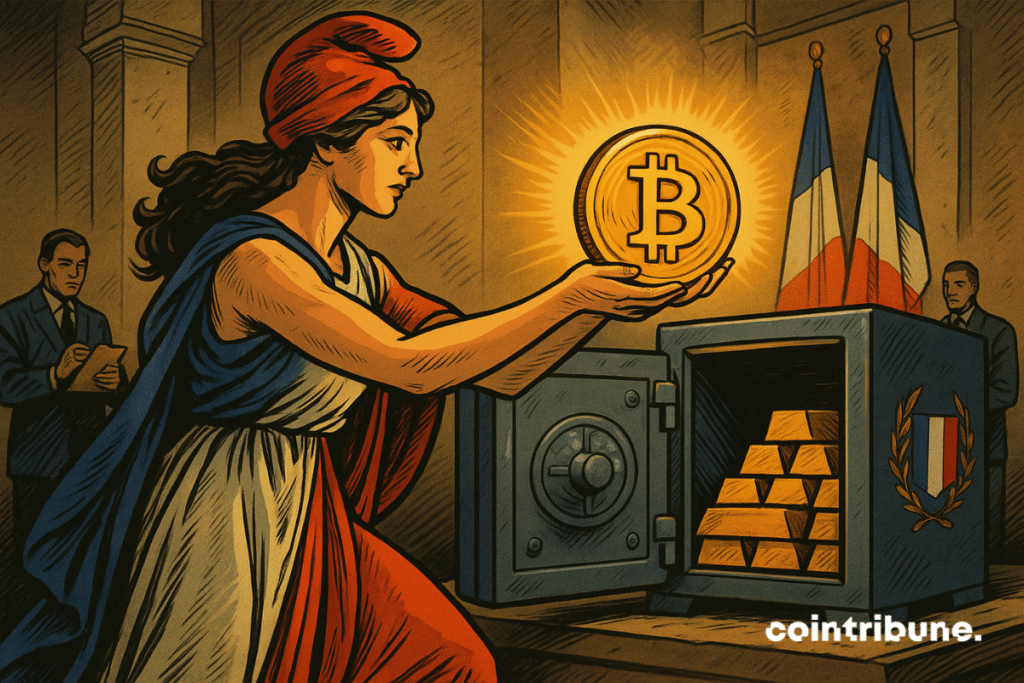🟥 Exclusive @TheBigWhale_
— Grégory Raymond 🐳 (@gregory_raymond) October 28, 2025
A pro-crypto bill will be tabled today in the French Parliament by @partiudr led by @eciotti
This is the first time such a comprehensive text on the subject has been proposed in France. 🇫🇷
Here are the proposals, which fall into three main areas.
👉… pic.twitter.com/qIf6KJor8m
A
A
420K BTC For France : The Boldest Crypto Proposal Yet
Tue 28 Oct 2025 ▪
5
min read ▪ by
Getting informed
▪
Bitcoin (BTC)
Summarize this article with:
What if the future of monetary reserves no longer relied on gold or fiat currencies, but on bitcoin ? In France, a bill supported by the UDR party plans to create a national reserve of 420,000 BTC. A groundbreaking initiative which, although driven by a minority parliamentary group, challenges the foundations of monetary sovereignty. At a time when states are groping with cryptos, this project revives a major strategic debate.

In brief
- A bill supported by the UDR party aims to create a national reserve of 420,000 bitcoins in France.
- The project plans a progressive accumulation over 7 to 8 years, through a dedicated public institution.
- A budget of 15 million euros per day would be dedicated to BTC purchases, without resorting to debt.
- The stated goal is to diversify the State’s reserves and integrate Bitcoin into a monetary sovereignty strategy.
A national reserve of 420,000 bitcoins : UDR’s committed bet
In a legislative text, the UDR party, chaired by Éric Ciotti, intends to make France a pioneer in digital monetary sovereignty, while the institutional rush towards bitcoin is in full swing.
The project aims to build a national strategic reserve of 420,000 bitcoins, representing 2 % of the total circulating BTC supply, and aims to “position France as a pro-Bitcoin European institutional hub”.
To realize this initiative, the UDR plans to create a public administrative institution (EPA) responsible for overseeing operations over a 7 to 8 year period.
The operational terms of this accumulation are detailed in the bill as follows :
- The daily invested amount : 15 million euros, exclusively dedicated to buying BTC ;
- The annual acquisition target : about 55,000 BTC per year ;
- Funding through public savings, without additional monetary issuance or debt ;
- An institutional framework by an independent public body, guaranteeing transparency of operations.
This project aims to meet a need to diversify national reserves, historically concentrated in fiat currencies such as the euro or dollar. By introducing bitcoin into the reserve strategy, the UDR advocates a global interpretation of sovereignty, based on assets not issued by states and resilient against geopolitical or monetary pressures.
For the first time in France, a parliamentary text formally proposes integrating a native blockchain asset into the State’s strategic heritage.
A project with multiple ramifications
The text does not only plan the purchase of BTC on the markets. It also proposes an organic accumulation strategy, through public bitcoin mining, leveraging the excess nuclear and hydroelectric energy production available in the territory.
The ambition is to make the operation economically viable, even virtuous, by mobilizing low-carbon and already existing energy. Added to this is the integration of bitcoins seized during judicial procedures into the reserve, a practice already partially implemented in several countries, including France. Bitcoins from judicial seizures, notably in cases linked to the dark web, can be redirected to the national reserve.
Beyond bitcoin, the legislative project proposes measures to promote the use of euro stablecoins, notably through a 200 € tax exemption on payments, and by allowing certain taxes to be paid in cryptos.
The text goes as far as explicitly rejecting central bank digital currencies (CBDCs), described as a “threat to individual financial freedoms”, and instead proposes tax and regulatory relief for stablecoin issuers in Europe. It also considers the possibility of using bitcoin as collateral in specific bank loans.
This direction marks an attempt to strategically reposition France in the European digital monetary landscape. By opposing head-on the CBDCs, promoted by the ECB, while defending an alternative model based on decentralized cryptos, the text reflects a growing divide between advocates of strengthened state control and supporters of decentralized digital sovereignty. Although the chances of adoption remain limited in the short term, with the UDR having only 16 deputies out of 577, this initiative could open the way to parliamentary debates and force major parties to take a stance on an increasingly strategic issue.
Maximize your Cointribune experience with our "Read to Earn" program! For every article you read, earn points and access exclusive rewards. Sign up now and start earning benefits.
A
A
Diplômé de Sciences Po Toulouse et titulaire d'une certification consultant blockchain délivrée par Alyra, j'ai rejoint l'aventure Cointribune en 2019. Convaincu du potentiel de la blockchain pour transformer de nombreux secteurs de l'économie, j'ai pris l'engagement de sensibiliser et d'informer le grand public sur cet écosystème en constante évolution. Mon objectif est de permettre à chacun de mieux comprendre la blockchain et de saisir les opportunités qu'elle offre. Je m'efforce chaque jour de fournir une analyse objective de l'actualité, de décrypter les tendances du marché, de relayer les dernières innovations technologiques et de mettre en perspective les enjeux économiques et sociétaux de cette révolution en marche.
DISCLAIMER
The views, thoughts, and opinions expressed in this article belong solely to the author, and should not be taken as investment advice. Do your own research before taking any investment decisions.